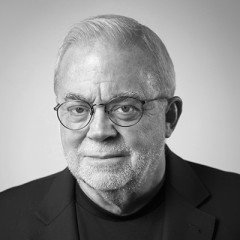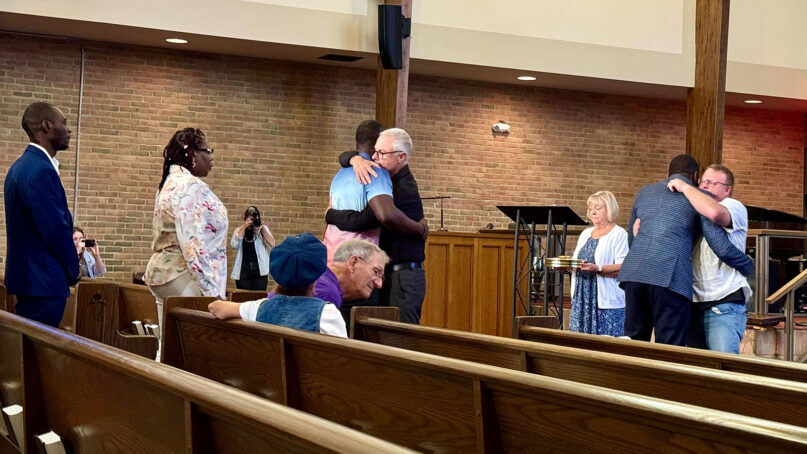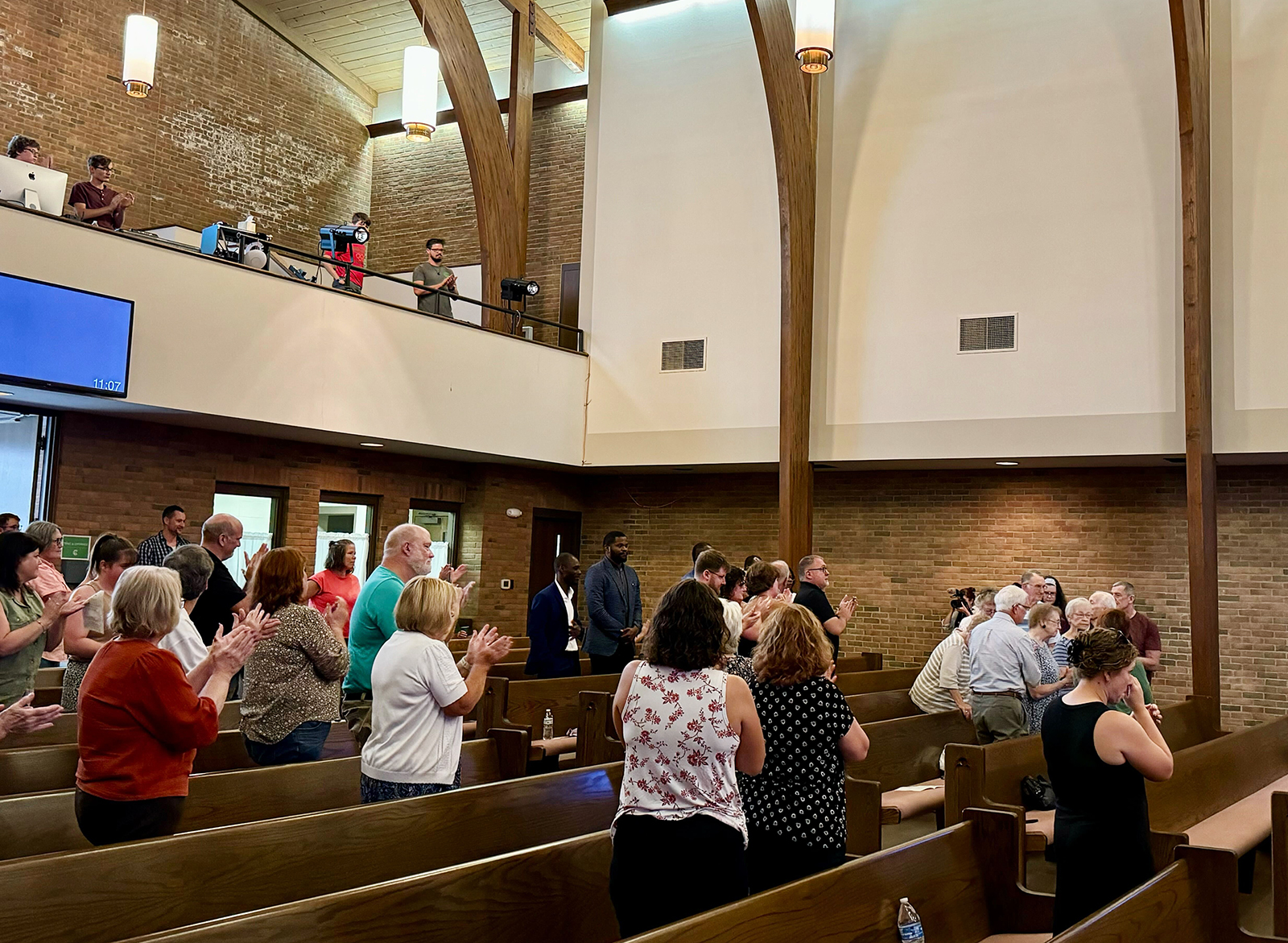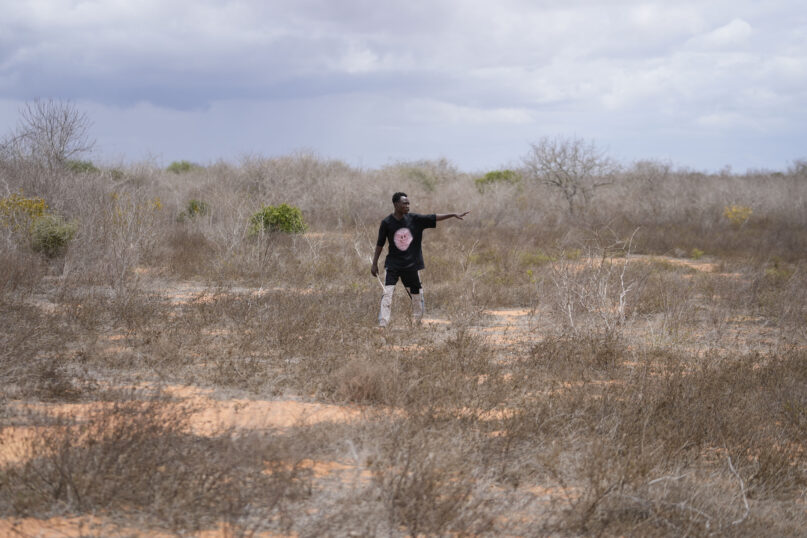Pay attention to what Trump lies about most
Outlandish? Yes. Farcical? Absolutely. But also sinister and revealing.

Republican presidential nominee former President Donald Trump speaks during a presidential debate with Democratic presidential nominee Vice President Kamala Harris at the National Constitution Center, Tuesday, Sept. 10, 2024, in Philadelphia.
By Jim Wallis
(RNS) — The most talked about moment from last Tuesday’s debate has turned out to be not the two candidates’ policy differences on health care or housing or even any real discussion about immigration but, rather, Donald Trump’s claim that in Springfield, Ohio, Haitians hired by local companies are stealing and eating other people’s household pets.
“They’re eating the dogs, the people that came in, they’re eating the cats,” said Trump in answer to a question about immigration, repeating a calumny that he and his ticket mate, JD Vance, had been retailing at their campaign rallies. “They’re eating the pets of the people who live there, and that is what’s happening in this country, and it is a shame.”
The debate’s co-moderator, David Muir, the ABC news anchor whose network had actually fact-checked the claim, responded that the Springfield city manager had told ABC “there had been no credible reports of pets being harmed, injured, or abused by people in the city’s immigrant community.”
Trump responded, “I’ve seen people on television who said immigrants were eating the pets of people who lived there.”
RELATED: ‘Haitians are not eating pets’: Springfield faith leaders stand with embattled migrants
Outlandish? Yes. Farcical? Absolutely. But also sinister and revealing. It’s important when faced with a serial liar’s untruths to go beyond a shrug that says “That’s just Trump!” and examine what and who the person lies about most. It’s likely the key to the compulsion that leads to the lies.
Over and over again, when it comes to Trump, the lies are about migrants, refugees, asylum seekers. Trump strategically lies about those who are racially different from white Americans, his base whom he tries to make angrier and angrier. While saying he wouldn’t mind more immigrants from Norway, Trump has consistently demonized immigrants, calling them “rapists” and “criminals.” He accuses them of bringing in drugs and disease. Lately he has portrayed them as inmates of prisons and insane asylums, members of terrorist organizations and gangs, all coming to do us harm.

Migrants seeking asylum line up while waiting to be processed after crossing the border Wednesday, June 5, 2024, near San Diego, Calif. (AP Photo/Eugene Garcia)
In truth the people seeking to come to America are those Jesus told us to welcome. In the 25th chapter of the Gospel of Matthew, Jesus says how we welcome the stranger, demonstrates how we welcome or don’t welcome him. The word “stranger” in the gospel text literally means “immigrant” and “refugee.” Jesus says, “As you have done to the least of these, you have done to me.”
Anyone who has contact with the families and children coming from south of the U.S.-Mexican border know that these constant attacks are based on lies. Demagogues don’t like data, but the data on immigrants shows that migrants commit fewer crimes than native U.S. citizens. Undocumented immigrants can’t vote, and don’t, despite the Republicans’ repetition of a myth that the flood of “illegal aliens” are being welcomed to support Democrats.
Most Americans don’t have any personal contact with immigrants, however, and as demagogues repeat their lies over and over, people start to believe them. What many white Christians who support Trump lack is what I call a theology of proximity: Getting to know real people and their stories and their children always changes hearts and minds — in my experience, it even dissolves white conservative stereotypes and caricatures. Everything is about relationships, and encountering immigrants would easily wipe away all of Trump’s lies.
Trump also spoke admiringly — and tellingly — about Hungarian dictator Viktor Orbán and Russian dictator Valdimir Putin, both demagogues who fuel human divisions. Such leaders want people to believe only strong men can restore order in a divided society. To create this picture they narrow the definition of who our neighbors are, turning many of those around us into enemies. Our religious language calls this “othering,” and all faith traditions clearly and consistently condemn it.
That’s what the weird dogs and cats language was all about Tuesday night: fear, hate, violence and power. Expanding the definition of our neighbor — which faith does — defeats demagogues.
Sadly, we are still waiting to hear any of Trump’s white evangelical supporters speak up for the strangers that Jesus told us to welcome. Let’s watch for how many evangelical leaders preach on Matthew 25 in the next few Sundays, or any of the more than 400 verses in the Bible about caring for immigrants. Let’s hope preachers everywhere turn this into a Matthew 25 election.
Last Wednesday (Sept. 11), the day after the debate, I was given a tour of an amazing community center in Tucson, Arizona, where Christians care for those seeking asylum who have just arrived in the United States and are now legally on their way to families and sponsors in America.
It was a Matthew 25 day for me. After long, dangerous and very difficult journeys, after being exploited, robbed, ransomed, raped, tortured, after watching friends die, these people at last found the loving welcome they were so longing for. I saw the smiles on the faces of mothers, fathers and young children.
Later that evening, people of faith from all over southern Arizona packed into Southside Presbyterian Church to hear their now-retired pastor, John Fife, and others talk about being charged as felons for welcoming strangers across the border in a faithful ministry of Christ for many decades. We need more people like my dear friend John, who was willing to become a Matthew 25 felon, who told the diverse gathering the joy of following Jesus.

The Rev. Jim Wallis. (Courtesy photo)
(The Rev. Jim Wallis is director of Georgetown University’s Center on Faith and Justice and the author, most recently, of “The False White Gospel: Rejecting Christian Nationalism, Reclaiming True Faith, and Refounding Democracy.” The views expressed in this commentary do not necessarily reflect those of Religion News Service.)














